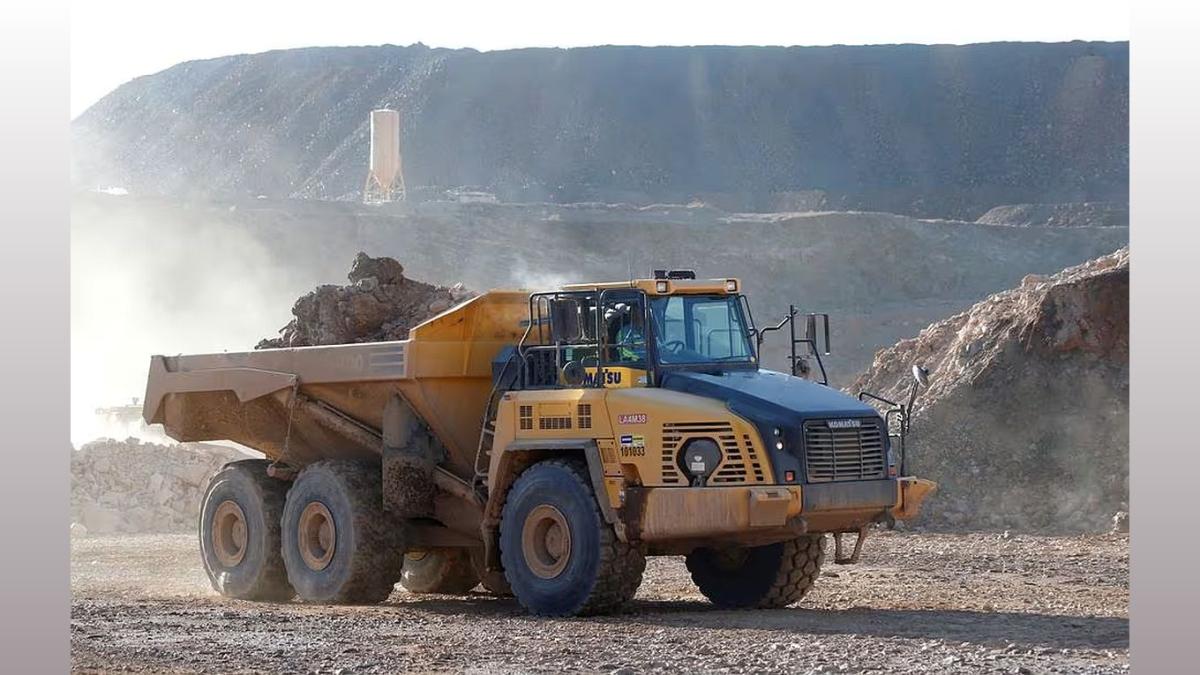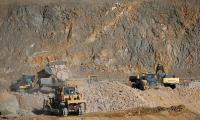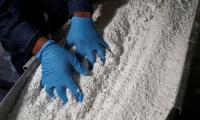India to Auction Critical Minerals & Offshore Blocks in 2024
India's mining sector is set for a boost in 2024 with auctions of critical minerals, offshore mineral blocks, and exploration licenses. This move aims to enhance self-reliance and drive economic growth.

Photograph: Steve Marcus/Reuters
New Delhi, Dec 28 (PTI) Auctioning of critical mineral and offshore mineral blocks as well as giving exploration licences in 2024 are set to rejuvenate the country's mining sector that has the potential for a multiplier effect on economic growth.
As the government focuses on self reliance, Mines Minister Pralhad Joshi told PTI, "every few months (in 2024) we will bring out a new batch of critical minerals for auction."
Not just critical minerals, exploration of deep-seated minerals like gold and copper, as well as offshore areas are on the priority list.
In November, the government launched the first tranche of e-auction of 20 mines of critical and strategic minerals. The blocks include copper, lithium, nickel and potash.
A committee, set up by the mines ministry, had identified 30 minerals as critical and strategic, considering their economic importance and supply risk vis-a-vis India's priorities and future requirements for energy transition.
Besides, a new Mineral Concession namely exploration licence for 29 deep-seated minerals and critical minerals has been introduced through the Mines and Minerals (Development and Regulation) Amendment Act, 2023.
Critical minerals, including lithium and cobalt, are crucial for technology, manufacturing and other industries.
Deep-seated minerals are those located deep within the earth's crust, and are more difficult to extract. Gold, copper and diamonds are among deep-seated minerals.
According to the minister, the rules for exploration of offshore mineral blocks will be finalised soon and then auction of such blocks will start.
The Offshore Areas Mineral (Development and Regulation) Act, 2002 has been amended to provide an auction route for awarding production leases for offshore minerals.
"Currently, we are making rules. We are making seven types of rules under that Act to ensure that we can auction offshore mineral blocks. We have got 15 blocks explored by GSI (Geological Survey of India)... we have to do inter-ministerial consultations," Mines Secretary V L Kantha Rao told PTI.
After finalising the rules, he said the auctions are likely to be done in March or April next year.
"Furthermore, we are doing two things. One is getting a regime of exploration licence under which people can bid... for that we are making rules... and (then) we will auction some blocks for exploration," he said.
In the proposed regime, the government will auction blocks for exploration. "We will start with about 15-20 (blocks). That is the new regime we are bringing in the coming year," he said.
About the major activities of the mines ministry in the current year, Joshi said that two legislations were amended in 2023.
"MMDR Act was amended to issue exploration licences. Auction of critical minerals was another big achievement," the minister said.
The amended Mines and Minerals (Development and Regulation) Act is aimed at encouraging private sector participation in the exploration of essential and deep-seated minerals.
While India possesses around six per cent of the world's rare earth reserves, its contribution to the global output stands at just 1 per cent. The amended law is also part of larger efforts to ensure resilience within critical mineral supply chains.
As the government focuses on self reliance, Mines Minister Pralhad Joshi told PTI, "every few months (in 2024) we will bring out a new batch of critical minerals for auction."
Not just critical minerals, exploration of deep-seated minerals like gold and copper, as well as offshore areas are on the priority list.
In November, the government launched the first tranche of e-auction of 20 mines of critical and strategic minerals. The blocks include copper, lithium, nickel and potash.
A committee, set up by the mines ministry, had identified 30 minerals as critical and strategic, considering their economic importance and supply risk vis-a-vis India's priorities and future requirements for energy transition.
Besides, a new Mineral Concession namely exploration licence for 29 deep-seated minerals and critical minerals has been introduced through the Mines and Minerals (Development and Regulation) Amendment Act, 2023.
Critical minerals, including lithium and cobalt, are crucial for technology, manufacturing and other industries.
Deep-seated minerals are those located deep within the earth's crust, and are more difficult to extract. Gold, copper and diamonds are among deep-seated minerals.
According to the minister, the rules for exploration of offshore mineral blocks will be finalised soon and then auction of such blocks will start.
The Offshore Areas Mineral (Development and Regulation) Act, 2002 has been amended to provide an auction route for awarding production leases for offshore minerals.
"Currently, we are making rules. We are making seven types of rules under that Act to ensure that we can auction offshore mineral blocks. We have got 15 blocks explored by GSI (Geological Survey of India)... we have to do inter-ministerial consultations," Mines Secretary V L Kantha Rao told PTI.
After finalising the rules, he said the auctions are likely to be done in March or April next year.
"Furthermore, we are doing two things. One is getting a regime of exploration licence under which people can bid... for that we are making rules... and (then) we will auction some blocks for exploration," he said.
In the proposed regime, the government will auction blocks for exploration. "We will start with about 15-20 (blocks). That is the new regime we are bringing in the coming year," he said.
About the major activities of the mines ministry in the current year, Joshi said that two legislations were amended in 2023.
"MMDR Act was amended to issue exploration licences. Auction of critical minerals was another big achievement," the minister said.
The amended Mines and Minerals (Development and Regulation) Act is aimed at encouraging private sector participation in the exploration of essential and deep-seated minerals.
While India possesses around six per cent of the world's rare earth reserves, its contribution to the global output stands at just 1 per cent. The amended law is also part of larger efforts to ensure resilience within critical mineral supply chains.
You May Like To Read
TODAY'S MOST TRADED COMPANIES
- Company Name
- Price
- Volume
- Vodafone-Idea-L
- 11.65 (+ 3.56)
- 106772451
- Alstone-Textiles
- 0.28 ( -3.45)
- 44187760
- Mangalam-Industrial
- 0.88 ( -2.22)
- 39177573
- Sunshine-Capital
- 0.27 (+ 3.85)
- 35956340
- GMR-Airports
- 104.40 (+ 6.37)
- 30453005




